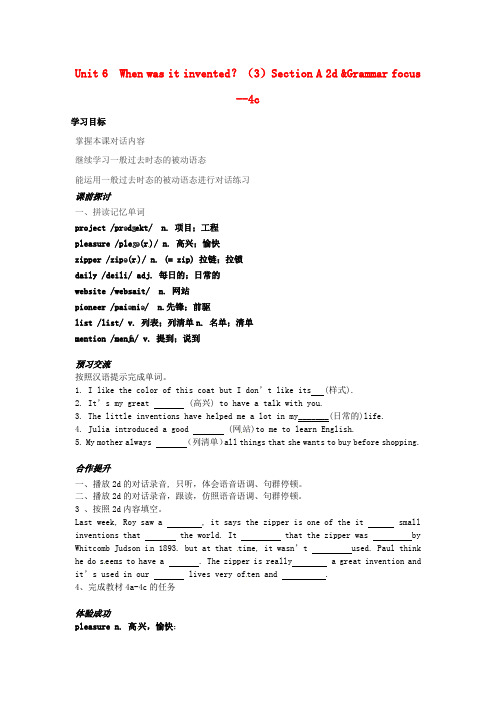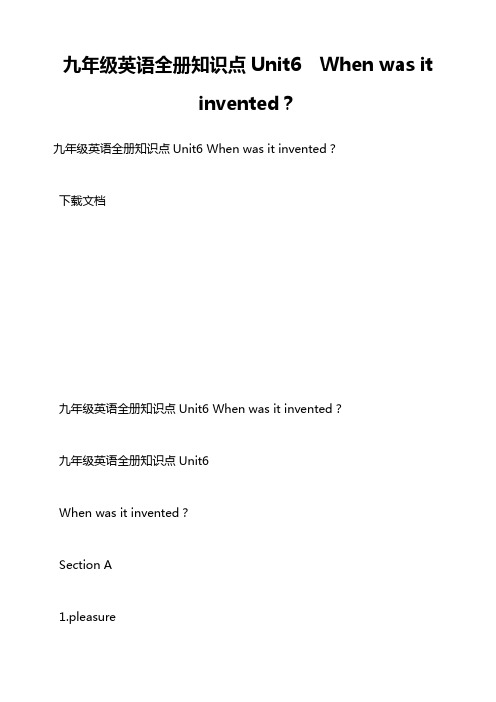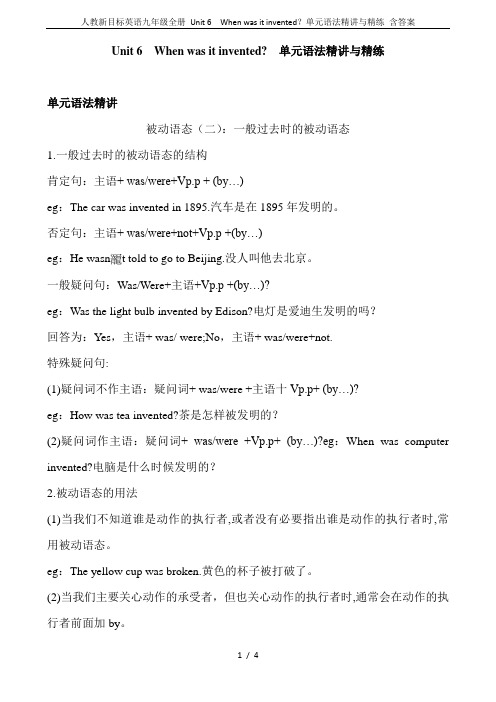2017秋九年级英语全册Unit6Whenwasitinvented语法聚焦(六)习题课件(新版)人教新目标版
- 格式:ppt
- 大小:264.50 KB
- 文档页数:14

Unit 6 When was it invented?(3)Section A 2d &Grammar focus--4c学习目标掌握本课对话内容继续学习一般过去时态的被动语态能运用一般过去时态的被动语态进行对话练习课前探讨一、拼读记忆单词project /prədʒekt/ n. 项目;工程pleasure /pleʒə(r)/ n. 高兴;愉快zipper /zipə(r)/ n. (= zip) 拉链;拉锁daily /deili/ adj. 每日的;日常的website /websait/ n. 网站pioneer /paiəniə/ n.先锋;前驱list /list/ v. 列表;列清单n. 名单;清单mention /menʃn/ v. 提到;说到预习交流按照汉语提示完成单词。
1. I like the color of this coat but I don’t like its (样式).2. It’s my great (高兴) to have a talk with you.3. The little inventions have helped me a lot in my_______(日常的)life.4. Julia introduced a good (网站)to me to learn English.5. My mother always (列清单)all things that she wants to buy before shopping.合作提升一、播放2d的对话录音, 只听,体会语音语调、句群停顿。
二、播放2d的对话录音,跟读,仿照语音语调、句群停顿。
3 、按照2d内容填空。
Last week, Roy saw a , it says the zipper is one of the it small inventions that the world. It that the zipper was by Whitcomb Judson i n 1893. but at that time, it wasn’t used. Paul think he do s eems to have a . The zipper is really a great invention and it’s used in our lives very of ten and .4、完成教材4a-4c的任务体验成功pleasure n. 高兴,愉快;常常利用于口语中;it’s my pleasure. With pleasure.【例句】It’s my pleasure to help you look after your pet cat.我感到很荣幸帮你照看你的宠物猫。

九年级英语全册知识点Unit6 When was itinvented?九年级英语全册知识点Unit6 When was it invented?下载文档九年级英语全册知识点Unit6 When was it invented?九年级英语全册知识点Unit6When was it invented?Section A1.pleasure乐事;高兴的事高兴;愉快常用表达With pleasure乐意效劳My pleasurepleasure高兴;乐趣pleasantadj.令人愉快的,强调事物本身的性质pleasedadj.感到高兴的, 强调人的心理2.such如此的;这样的such+a(an)+adj.+单数可数名词+that从句eg:He got such a bad cold that he coughed day and night. such+adj.+不可数名词+that从句eg:She has made such great progress that many people like her. such+adj.+名词复数+that从句eg:They are such interesting books that we all like them.such修饰名词He is such a kind man.修饰形容词或副词He is so kind a man.3.daily=every dayPeople’s Daily《人民日报》4.mention提到;说到Don’t mention it mention sb./sth.(to sb.) (向某人)提起某人或某事mention doing sth.提到做某事5.It is said that...据说……=People say that...相同结构It is reported that...据报道……It is supposed that...据猜测……It is believed that...人们认为……It’s kno wn that...众所周知……6.辨析take place指事先安排的事情eg: Great changes have taken place in our city over the years. happen指偶然发生的事情eg:An accident happened in that street.7.doubtwithout doubt毫无疑问;的确doubt sth.怀疑某事eg:No one doubts his ability.8.at a low priceeg:This sweater is on sale at a low price.9.translatetranslate... into ...把……翻译成……eg:Don’t translate everything into Chinese when you read English articles.Section B1.by mistake错误地;无意中eg:I took your bag by mistake.2.the Olympics=the Olympic Games语动词常用复数形式3.divide...into把……分成……eg: The teacher divided us into four teams.4.stop句型stop ...from ...阻止……做某事eg: Nothing can stop China from being stronger and stronger. stop sb. from doing sth.= prevent sb. from doing sth.=keep sb. from doing sth.eg:Can you stop kids from playing Glory of Kings ?not only ... but also...neither...nor..既不……也不…… (两者都不)either...or...不是……就是……there be 结构6.look up to钦佩;仰慕=admireeg: Lots of kids look up to Li Yifeng nowadays. 仰起头看……7.hero复数:+es以o结尾加es变复数的名词黑人(Negro) 英雄(hero)爱吃西红柿(tomato) 炒土豆(potato) Section A1.pleasure乐事;高兴的事高兴;愉快常用表达With pleasure乐意效劳pleasure高兴;乐趣pleasantadj.令人愉快的,强调事物本身的性质pleasedadj.感到高兴的, 强调人的心理2.such如此的;这样的such+a(an)+adj.+单数可数名词+that从句such+adj.+不可数名词+that从句eg:She has made such great progress that many people like her. such+adj.+名词复数+that从句eg:They are such interesting books that we all like them.such修饰名词He is such a kind man.修饰形容词或副词He is so kind a man.3.daily=every day4.mention提到;说到Don’t mention it mention sb./sth.(to sb.) (向某人)提起某人或某事mention doing sth.提到做某事5.It is said that...据说……=People say that...相同结构It is supposed that...据猜测……It is believed that...人们认为……It’s known that...众所周知……6.辨析take place指事先安排的事情eg: Great changes have taken place in our city over the years. happen指偶然发生的事情eg:An accident happened in that street.7.doubt毫无疑问;的确doubt sth.怀疑某事eg:No one doubts his ability.8.at a low priceeg:This sweater is on sale at a low price.9.translatetranslate... into ...把……翻译成……eg:Do n’t translate everything into Chinese when you read English articles.Section B1.by mistake错误地;无意中eg:I took your bag by mistake.2.the Olympics=the Olympic Games语动词常用复数形式eg:The 30th Olympics were heldin London in 2012.3.divide...into把……分成……eg: The teacher divided us into four teams.4.stop句型stop ...from ...阻止……做某事eg: Nothing can stop China from being stronger and stronger. stop sb. from doing sth.= prevent sb. from doing sth.=keep sb. from doing sth.eg:Can you stop kids from playing Glory of Kings ?5.就近原则not only ... but also...neither...nor..既不……也不…… (两者都不)either...or...不是……就是……there be 结构6.look up to钦佩;仰慕=admireeg: Lots of kids look up to Li Yifeng nowadays.仰起头看……eg: The girl is so short that she has to look up to her elder sister.7.hero复数:+es以o结尾加es变复数的名词黑人(Negro) 英雄(hero)爱吃西红柿(tomato) 炒土豆(potato)。

Unit 6 When was it invented?【知识点整理】1。
被动语态(1)被动语态表示句子的主语是谓语动词所表示的动作承受者.(2)被动语态基本结构:be+及物动词的过去分词(如果是不及物动词,其过去分词应带有相应的介词)(3)被动语态中的be 是助动词,有人称、数和时态的变化。
一般现在时的被动语态为:am/is/are+过去分词一般过去时的被动语态为:was/were+ 过去分词与情态动词连用的被动语态:情态动词+ be + 过去分词(4)被动语态中动作的发出者或执行者做介词by的宾语,放在句末,by 表示“由,被”的意思,如何理解被动语态?主动语态:主语+谓语动词+宾语+其他成分被动语态:主语+be+过去分词+by+宾语+其他成分如:Many people speak English.English is spoken by many people。
3。
invent v。
发明inventor n. 发明家invention n。
发明,可数名词4. be used for doing ,用来做…(是被动语态)Pens are used for writing. 笔是用来写的。
5。
给某人某样东西give sth。
to sb。
I gave a pen to him。
我给他一支笔.give sb. sth。
I gave him a pen。
我给他一支笔。
6。
all day 整天7。
salty adj。
咸的salt n. 盐8. by mistake 错误地(犯错是:make mistake,这些常见的短语大家务必要掌握)I took the umbrella by mistake. 我不小心拿错了雨伞。
9。
make sb./sth+形容词:使…怎么样It made me happy。
它使我高兴make sb./sth+名词:让…做…It made me laugh。
它让我发笑10. by accident 意外,偶然(常见短语,考的最多的是它的意思)I met her by accident at bus stop. 我在公共汽车站意外地见到了她。

人教版九年级英语Unit6 When was it invented?知识要点语法:1、被动语态(1). 被动语态表示句子的主语是谓语动词所表示的动作承受者。
(2). 被动语态基本结构:be+及物动词的过去分词(如果是不用物动词,其过去分词应带有相应的介词)(3). 被动语态中的be 是助动词,有人称、数和时态的变化。
一般现在时被动语态为:am/is/are+过去分词一般过去时被动语态为:was/were+ 过去分词与情态动词连用的被动语态:情态动词+ be + 过去分词(4). 被动语态中动作的发出者或执行者做介词by的宾语,放在句末,by 表示“由,被”的意思2、如何理解被动语态?为更清晰、更深刻地理解被动语态的含义,可以将主动语态和被动语态的句子结构进行比较。
主动语态:主语+ 谓语动词+ 宾语+ 其他成分被动语态:主语+ be +过去分词+ by +宾语+其他成分如:被动语态English is spoken by many people.课文知识要点:1、When was it invented?它是什么时候发明的?invent v. 发明→inventor n. 发明家→invention n. 发明可数名词invent v. “发明”指发明创造出自然界本来不存在的东西,如工具、方法、手段、汽车、电器、合成材料等。
Bell invented the telephone. 贝尔发明了电话。
Smith invented a new teaching method. 史密斯发明了一种新的教学方法。
Edison, a great inventor, invented over 1’000 inventions all his life.2、What is it used for?它是用来做什么的?be used for“用来做…”;此短语中的for是介词,表示用途,后接名词或动词-ing形式。

Unit 6 When was it invented? 单元语法精讲与精练单元语法精讲被动语态(二):一般过去时的被动语态1.一般过去时的被动语态的结构肯定句:主语+ was/were+Vp.p + (by…)eg:The car was invented in 1895.汽车是在1895年发明的。
否定句:主语+ was/were+not+Vp.p +(by…)eg:He wasn t told to go to Beijing.没人叫他去北京。
一般疑问句:Was/Were+主语+Vp.p +(by…)?eg:Was the light bulb invented by Edison?电灯是爱迪生发明的吗?回答为:Yes,主语+ was/ were;No,主语+ was/were+not.特殊疑问句:(1)疑问词不作主语:疑问词+ was/were +主语十Vp.p+ (by…)?eg:How was tea invented?茶是怎样被发明的?(2)疑问词作主语:疑问词+ was/were +Vp.p+ (by…)?eg:When was computer invented?电脑是什么时候发明的?2.被动语态的用法(1)当我们不知道谁是动作的执行者,或者没有必要指出谁是动作的执行者时,常用被动语态。
eg:The yellow cup was broken.黄色的杯子被打破了。
(2)当我们主要关心动作的承受者,但也关心动作的执行者时,通常会在动作的执行者前面加by。
eg:The nice picture was drawn by a ten-year-old boy.这幅好看的画是由一个十岁的男孩画的。
单元语法精练一、单项选择。
()1.—When the bridge ?—Last year.A.did; buildB.was;buildC.was; builtD.did; built ()2.Flowers along the road last year.A.plantB.plantedC.are plantedD.were planted()3.Many buildings in Lushan in the earthquake on April 20th.A.have destroyedB.are destroyedC.were destroyedD.are destroying ()4.The girl was heard in the next room every afternoon.A.to singB.singC.singingD.sang()5.—Do you know Earth Day?—Sure.It in 1970 to tell us to protect our planet.A.sets upB.set upC.is set upD.was set up二、按要求完成句子,每空一词。

一、必背短语【教材内容解析】Section A1.I think the TV was invented before the car. (P. 41)invent用作及物动词,意为“发明、创造”,指创造出以前不存在的东西,invention 表示“发明物”;inventor表示“发明家”。
Edison invented the electric bulb.2.changing the style of the shoes (P. 42)style用作名词,表示“样式、款式”,in style表示“流行、时髦”,out of style表示“过时”。
I like different styles of clothes.Long shirts are black in style.3.With pleasure! (P. 42)with pleasure则表示“很乐意去做某事”,强调事情还没有去做,但是表达愿意效劳的意愿。
It’s a pleasure/It’s my pleasure/My pleasure表示“不客气、很乐意效劳”,常用来回答Thank you或者对效劳过的事情表示没什么,很乐意去做。
---Would you please take care of my dog while I am away.---With pleasure.---Thank you for taking care of my dog while I am away.---My pleasure.4.Is it really such a great invention? (P. 42)“such+a/an+adj.+n.”表示“如此……的……”,相当于“so+adj.+a/an+n.”。
I have never read such an interesting book.=I have never read so interesting a book.5.Think about how often it’s used in our daily lives.(P. 42)daily作形容词,表示“每日的、日常的”,相当于everyday。
对比一般过去时和一般将来时的被动语态一、构成对比1. 一般过去时的被动语态:was / were + 动词的过去分词如:The teaching building was built six years ago.这座教学楼建于六年前。
2. 一般将来时的被动语态:“will be + 动词的过去分词”或“am / is / are going to be + 动词的过去分词”如:This museum will / is going to be finished next month.这座博物馆将于下个月竣工。
二、否定形式和疑问形式对比1. 否定形式:★一般过去时的被动语态:was / were + not + 动词的过去分词如:The window was not broken by him.窗玻璃不是他打碎的。
★一般将来时的被动语态:“will not be + 动词的过去分词”或“am / is / are not going to be + 动词的过去分词”如:The new film will not / isn’t going to be show n in our city next week.那部新电影下周不在我们城市放映。
2. 疑问形式:★一般过去时的被动语态:通常把was / were置于主语前。
如:Were the textbooks written in 2000?这些课本是2000年写的吗?Where were those buses made?那些公共汽车是哪里制造的?★一般将来时的被动语态:将will, (be going to中的) am / is / are置于主语之前。
如:When will the road be opened to traffic?这条路什么时候通车?Are we going to be asked to attend the meeting?我们会被邀请参加会议吗?【趁热打铁】Ⅰ. 请选出能填入空白处的最佳选项。
Unit6《When was it invented ?》1.invent v. 发明 inventor n. 发明家invention n. 发明,可数名词The inventor has invented many inventions in the past few years.2. be used for doing=be used to do ,用来做…(是被动语态)(这个短语的考点有两点,一是used for的意思,二是for后面用动名词)Pens are used for writing. 笔是用来写的。
used to do 过去常常做某事be/get used to doing 习惯于做某事put into good use 好好利用use sth. to do 用某物做某事给某人某样东西 give sth. to sb.I gave a pen to him. 我给他一支笔。
give sb. sth.I gave him a pen. 我给他一支笔。
pass/offer /send/show/write/bring/sell/lend/serve/ tobuy/cook/make/get/sing/prepare for4. all day 整天 all evening/night the whole day5. salty adj. 咸的 salt n. 盐sour/sweet/bitter/hot/salty酸甜苦辣咸6. by mistake 错误地(犯错是:make mistakes=make a mistake,这些常见的短语大家务必要掌握)I took the umbrella by mistake. 我不小心拿错了雨伞。
7. by accident/chance 意外,偶然(常见短语,考的最多的是它的意思)I met her by accident at bus stop.我在公共汽车站意外地见到了她。